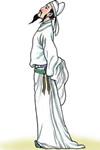(单词翻译:单击)
 李白(701年2月28日-762),字太白,号青莲居士,唐朝诗人,有“诗仙”之称,最伟大的浪漫主义诗人。汉族,出生于剑南道之绵州(今四川绵阳江油市青莲乡),一说生于西域碎叶城(今吉尔吉斯斯坦托克马克),5岁随父迁至剑南道之绵州(巴西郡)昌隆县(712年更名为昌明县),祖籍陇西郡成纪县(今甘肃平凉市静宁县南)。其父李客,育二子(伯禽、天然)一女(平阳)。存世诗文千余篇,代表作有《蜀道难》、《将进酒》等诗篇,有《李太白集》传世。762年病逝于安徽当涂,享年61岁。其墓在安徽当涂,四川江油、湖北安陆有纪念馆。
李白(701年2月28日-762),字太白,号青莲居士,唐朝诗人,有“诗仙”之称,最伟大的浪漫主义诗人。汉族,出生于剑南道之绵州(今四川绵阳江油市青莲乡),一说生于西域碎叶城(今吉尔吉斯斯坦托克马克),5岁随父迁至剑南道之绵州(巴西郡)昌隆县(712年更名为昌明县),祖籍陇西郡成纪县(今甘肃平凉市静宁县南)。其父李客,育二子(伯禽、天然)一女(平阳)。存世诗文千余篇,代表作有《蜀道难》、《将进酒》等诗篇,有《李太白集》传世。762年病逝于安徽当涂,享年61岁。其墓在安徽当涂,四川江油、湖北安陆有纪念馆。
李白青年时代出三峡之后,曾有相当长时期漫游于汉水流域和长江中下游一带。这些地区自六朝以来,就是商业发达、城市繁荣、商人们来往频繁之处。六朝乐府中的“吴声”、“西曲”即产生于这一地区,其中不少篇章就是表现商妇与丈夫离别的悲思的。李白是一位非常重视学习优秀文学遗产的作家,对于“吴声”“西曲”非常熟悉;他的生活经历又使他对商妇们的思想感情有相当的了解:这些正是他写作《长干行》的基础。
The River-Merchant's Wife: A Letter—Li Bai
长干行——李白
While my hair was still cut straight across my forehead,
妾发初覆额,
I played about the front gate, pulling flowers.
折花门前剧;
You came by on bamboo stilts, playing horse,
郎骑竹马来,
You walked about my seat, playing with blue plums.
绕床弄青梅。
And we went on living in the village of Chokan,
同居长干里,
Two small people, without dislike or suspicion.
两小无嫌猜。
At fourteen I married My Lord you.
十四为君妇,
I never laughed, being bashful.
羞颜未尝开。
Lowering my head, I looked at the wall.
低头向暗壁,
Called to, a thousand times, I never looked back.
千唤不一回。
At fifteen I stopped scowling,
十五始展眉,
I desired my dust to be mingled with yours,
愿同尘与灰。
Forever and forever and forever.
常存抱柱信,
Why should I climb the look out?
岂上望夫台。
At sixteen you departed,
十六君远行,
You went into far Ku-to-yen, by the river of swirling eddies,
瞿塘滟滪堆。
And you have been gone five months.
五月不可触,
The ms make sorrowful noise overhead.
猿声天上哀。
You dragged your feet when you went out.
门前迟行迹,
By the gate now, the moss is grown, the different mosses,
一一生绿苔。
Too deep to clear them away!
苔深不能扫,
The leaves fall early this autumn, in wind.
落叶秋风早。
The paired butterflies are already yellow with August,
八月蝴蝶黄,
Over the grass in the West garden.
双飞西园草。
They hurt me, I grow older.
感此伤妾心,
If you are coming down throught the narrows of the river Kiang,
坐愁红颜老!早晚下三巴,
Please let me know beforehand,
预将书报家。
And I will come out to meet you
相迎不道远,
As far as Cho-fu-Sa
直至长风沙。


